Nutrition in pregnancy is a topic of constant concern, because this is one of the factors that greatly affects the development of the fetus. The question is that what are the good foods for pregnant women? How much should pregnant women take to ensure the health of both mother and fetus? Let aFamilyToday Health explore right through the article below.
Maintaining a healthy pregnancy diet is essential. Because during this period, the nutritional needs of pregnant mothers increase a lot ( 1 ). In fact, pregnant women may need 350-500 extra calories a day during the second and third trimesters ( 2 ).
Therefore, a diet lacking important nutrients will negatively affect fetal development in the womb ( 3 , 4 , 5 ). Not to mention poor eating habits and excessive weight gain can also increase the risk of gestational diabetes and complications during pregnancy or childbirth ( 6 ).
Simply put, choosing good food for pregnant women will help ensure the health of both mother and baby. Moreover, this will also assist you to lose weight more easily after giving birth. Here are 9 essential foods for pregnancy:
1. Eggs - Healthy food for pregnant women
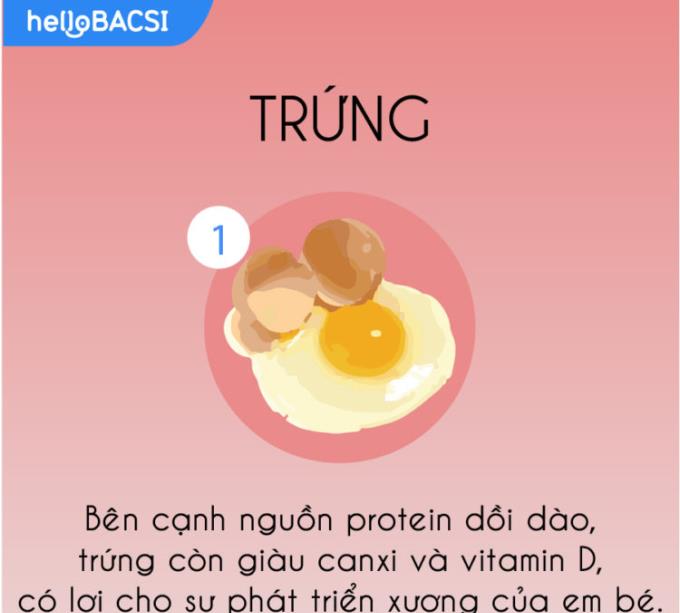
Eggs are one of the most nutritious foods. According to statistics, each egg contains only about 90 calories, but the ingredient has nearly all the nutrients needed during pregnancy.
Not only that, eggs are also a rich source of protein, and also add many important factors for the formation and development of fetal skeletal system and brain such as omega-3 fatty acids, choline, vitamin D, calcium. , zinc ... ( 7 )
During pregnancy, if the mother's body does not meet the choline requirements, there is a high risk of neural tube defects and impaired brain function in the fetus ( 8 , 9 ). Accordingly, the nutritional content of one egg is about 113 mg choline, accounting for about 25% of the recommended daily requirement for this nutrient (the requirement for pregnant women is 450 mg) ( 10 ).
Eggs are incredibly nutritious and a great way to increase the overall nutritional intake of pregnant women. Eggs also contain choline, an essential ingredient for fetal brain health and development.
2. Lentils
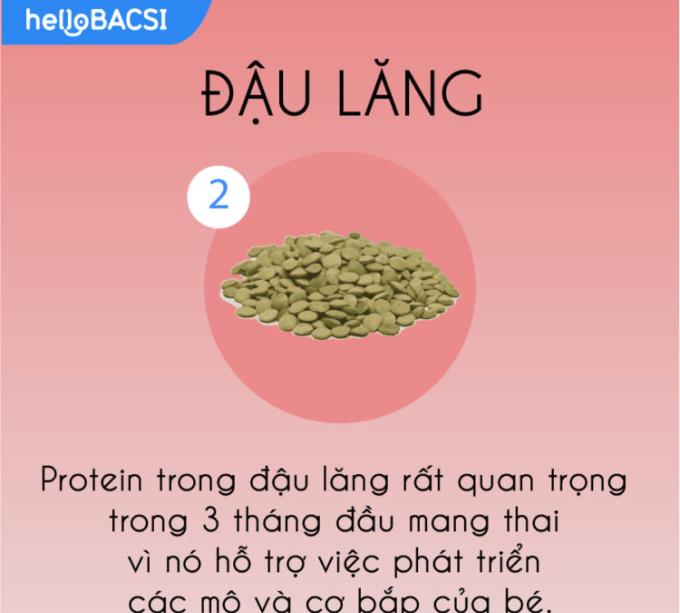
Referring to good foods for pregnant women, beans cannot be ignored. Because, they are an excellent source of fiber, protein, iron, folate (vitamin B9) and calcium. These are all essential ingredients to ensure the health of pregnancy.
Especially folate, one of the forms of vitamin B9, plays an important role in the health of both mother and baby, especially during the first trimester . Currently, most pregnant women do not get enough folate during this period ( 11 , 12 ).
Folate deficiency is strongly linked to the risk of neural tube defects and low birth weight infants . What's more, inadequate folate intake may also make your baby more susceptible to infections and disease in the future ( 13 , 14 ).
So, pregnant mothers from the time of reading this article should eat a variety of beans including: lentils, peas, soybeans, peanuts ... Each cup of cooked beans will provide from 65 to 90 % of the body's need for folate. Beans are also high in fiber, which will help pregnant mothers prevent constipation and hemorrhoids that are common during pregnancy ( 15 ).
Legumes are an excellent source of folate, fiber and many other nutrients. In particular, lentils are a lot of protein, iron, calcium ... promote the formation of tissue and muscle in children and the fiber in beans prevents constipation for pregnant women, helping pregnant mothers feel more comfortable.
3. Oranges, tangerines

What should pregnant women eat during pregnancy? Certainly, you cannot ignore oranges and tangerines because in addition to their delicious taste, they also add a lot of essential nutrients during pregnancy, most notably vitamin C, fiber, and a variety of other antioxidants. .
Accordingly, the abundant amount of vitamin C in oranges or tangerines will help the body absorb iron more easily. In fact, many pregnant mothers encounter iron deficiency, which in turn leads to the risk of anemia. In addition to this role, vitamin C is also extremely beneficial for skin health and improves the immune system ( 16 , 17 ).
Both oranges and tangerines themselves are fruits with a relatively low glycemic index (GI), so pregnant mothers can safely consume without worrying about blood sugar spikes. abruptly. Because of this, oranges and tangerines become the solution for people with gestational diabetes.
In addition, oranges, tangerines also provide plenty of water, fiber, especially folate to help prevent birth defects in the fetus. In addition to eating directly, pregnant mothers can use oranges and tangerines as juice to drink. However, you should not drink too much especially avoid it at night and when hungry will be very harmful.
Fruits like oranges and tangerines are high in vitamin C, fiber, vitamins, antioxidants and plant compounds. They can rehydrate and meet the nutritional needs of pregnant women.
4. Lean meat (beef, chicken, pork) - Food is good for pregnant women
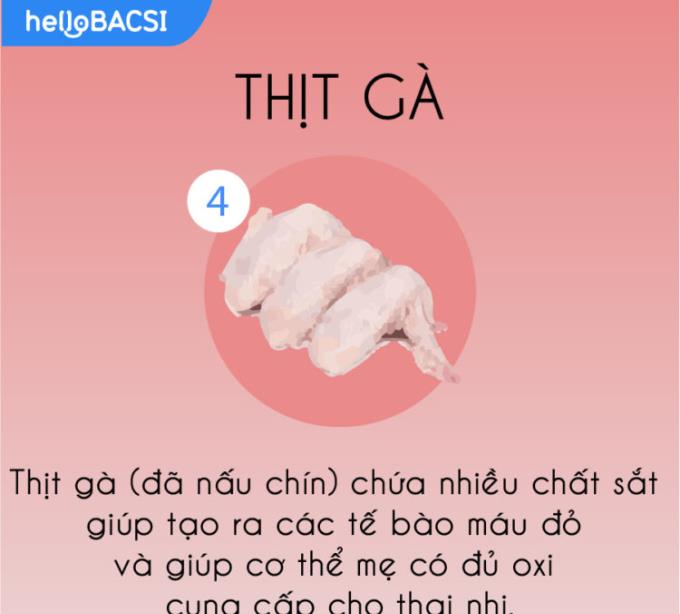
Beef, pork and chicken are high quality protein sources and are also good foods for pregnant women.
Chickens are rich in protein, minerals such as iron, calcium ... and vitamins A, D, E, B1, B2 ... help mothers supplement nutrition during pregnancy. For the fetus, iron in chicken helps to create red blood cells, helping mothers get enough oxygen to supply the baby. In addition, beef and pork are also rich in iron, choline and other B vitamins - all of which are essential to the mother and require higher levels during pregnancy.
Iron is an essential mineral that is used by red blood cells as part of hemoglobin. It is important to provide oxygen to all cells in your body. Pregnant women need more iron because of their increasing blood volume. This is especially important during the third trimester.
Low iron levels during early and mid-pregnancy can cause iron deficiency anemia, doubling the risk of preterm birth and low birth weight in the fetus ( 18 ).
Eating meats with foods rich in vitamin C, such as oranges or bell peppers, may also help increase iron absorption from meals.
Lean meats are a source of high-quality protein and are rich in iron, choline and B vitamins, all of which are important nutrients during pregnancy.
5. Butter
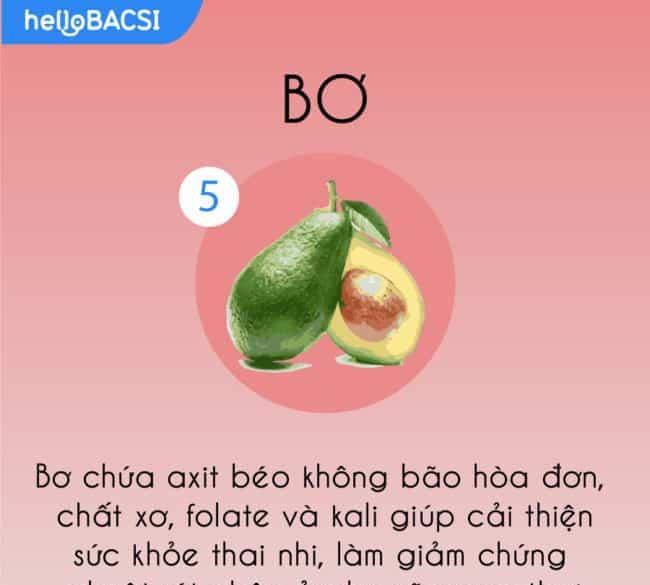
Avocados are an unusual fruit because they contain a lot of monounsaturated fatty acids and are also rich in fiber, vitamins B (especially folate), C, E, K and minerals. important as potassium, copper ...
Due to possessing important ingredients necessary for pregnancy such as folate, potassium, avocado is classified as a good food for pregnant women. As mentioned, monounsaturated fats play a role in the building up of fetal skin, brain and tissues ( 19 ).
The amount of potassium in avocado may help reduce cramps during pregnancy - a side effect of pregnancy for some women. In fact, avocados contain more potassium than bananas ( 20 ).
Avocados contain a large amount of monounsaturated fatty acids, fiber, folate and potassium. They can help improve fetal health and reduce leg cramps that are common in pregnant women.
6. Sweet potatoes
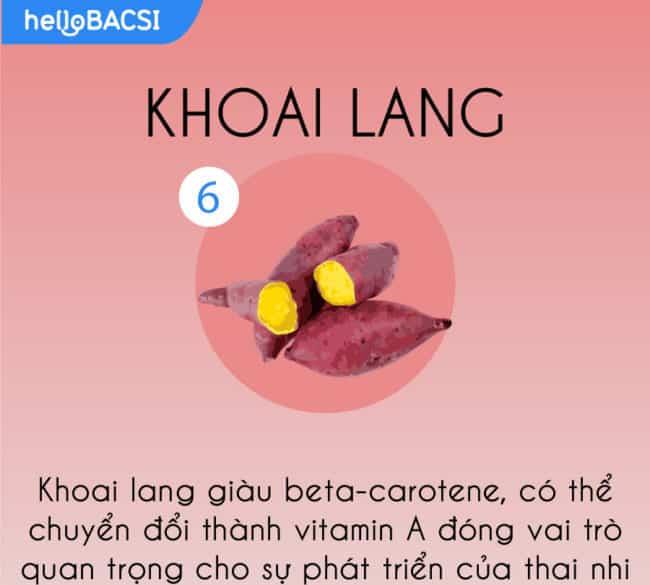
If you are wondering what foods will be good for pregnant women, sweet potatoes are a great choice for you. This root vegetable is rich in beta-carotene, a plant compound that is converted into vitamin A in your body. This nutrient is essential for the growth and differentiation of cells and tissues in the body. Therefore, this component is also very important to the development of the fetus.
Pregnant women are often advised to increase their vitamin A intake by 10-40% ( 21 ). However, expectant mothers should avoid taking vitamin A from animals because it can be toxic if consumed in excess. Therefore, beta-carotene is still the optimal source of vitamin A for pregnant women. Just 100-150 grams of cooked sweet potato meets the needs of this nutrient during the day with pregnant mothers.
Furthermore, sweet potatoes contain fiber, which can induce cravings, control blood sugar and improve digestive health by promoting bowel movements.
Sweet potatoes are an excellent source of beta-carotene, which your body can convert into vitamin A. In which, Vitamin A is important for the development and differentiation of cells in the developing fetus. friend.
7. Broccoli

Broccoli as well as dark green vegetables contain many nutrients that pregnant women need during pregnancy. These include fiber, vitamin C, vitamin K, vitamin A, calcium, iron, folate and potassium.
Not only that, broccoli in particular or cruciferous vegetables are rich in antioxidants, especially plant compounds like sulforaphane that are beneficial for the digestive system and the body's immune system.
Due to their high fiber content, these vegetables may also help prevent constipation during pregnancy , a very common problem among pregnant women that can affect the mentality of pregnant women.
Additionally, consumption of dark green cruciferous vegetables has also been linked to a reduced risk of a baby being born at low birth weight.
Overall, the vegetable group has many health benefits. However, there is a disadvantage that if processed by high heat during cooking will cause loss of nutrients. Therefore, pregnant mothers should pay close attention to this issue.
Broccoli contains vitamin C to help strengthen the immune system, calcium for bones, fiber for easy digestion, and prevent constipation. Moreover, during pregnancy, the iron contained in cabbage helps to increase red blood cells for the baby, helping the fetus to develop healthier.
8. Yogurt - Very good food for pregnant women
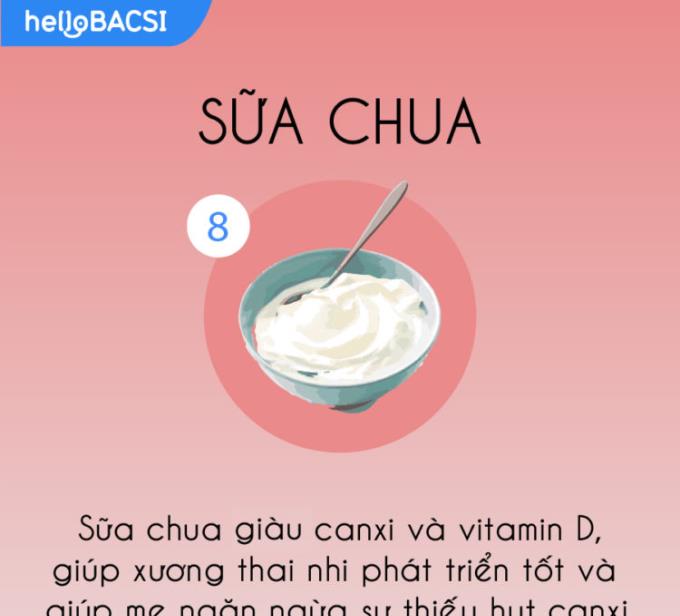
During pregnancy, pregnant women are advised to supplement with more protein and calcium to meet the needs of the growing fetus. Both of these ingredients are present in milk and milk products. However, yogurt is the recommended food for pregnant women. Because, it possesses more plentiful calcium, and also adds many healthy beneficial bacteria.
The probiotics in yogurt play a role in helping the digestive system to function properly. Thanks to that, pregnant mothers will prevent common problems in pregnancy such as constipation, flatulence, bloating. In addition, probiotics also create a balance, inhibit the growth of harmful bacteria, improve the body's resistance.
For those who suffer from lactose intolerance, yogurt can still be used, especially those containing probiotics.
Taking probiotics during pregnancy has also been shown to reduce the risk of complications such as pre-eclampsia , gestational diabetes, vaginal infections and allergies.
Yogurt is an everyday food that is loved by most women because of the beauty benefits of yogurt. Not only that, yogurt also brings many other benefits for women during pregnancy, helps the fetus develop good bones, prevents maternal calcium deficiency.
9. Salmon
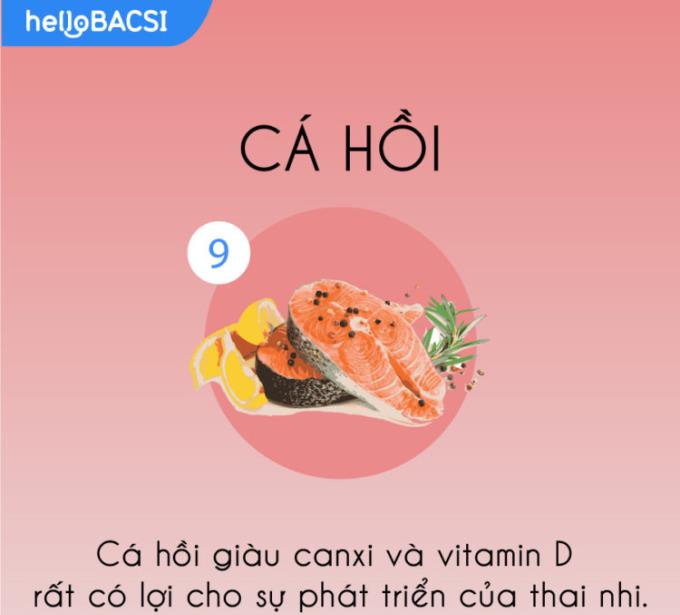
What should pregnant women eat during pregnancy? Hint, salmon, as this is a food rich in omega-3 fatty acids.
In fact, most people, including pregnant women, are not getting enough omega-3s through their diet.
Omega-3 fatty acids are essential during pregnancy, especially the long-chain omega-3 fatty acids DHA and EPA.
This substance, found in large amounts in seafood, plays a very important role in helping to build fetal brain and eyes.
However, pregnant women are often advised to limit seafood intake to only about twice a week, because mercury and other contaminants in fatty fish can harm pregnant women.
This has led some women to avoid seafood entirely, thereby limiting their intake of essential omega-3 fatty acids.
However, studies have shown that pregnant women who eat 2 meals of 3 fatty fish per week achieve the recommended amount of omega-3 and increase their blood EPA and DHA levels.
Furthermore, salmon is one of the very few natural sources of vitamin D, often lacking in the diet. This is important for many processes in your body, including bone health and immune function.
Salmon is considered a super food for pregnant mothers because it contains a lot of nutrients such as vitamins A, B, D ... micronutrients calcium, potassium, zinc ... In addition, the source of EPA and DHA in fish is very important for brain and eye development in a developing fetus. However, care should be taken to use appropriate amounts of salmon to avoid residue or mercury poisoning in fish.
Mom should remember the foods that are good for pregnant women and eat well for your baby to develop healthy, smart, have a healthy and safe pregnancy!




















